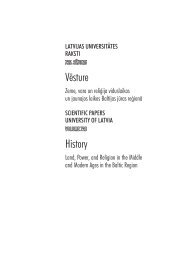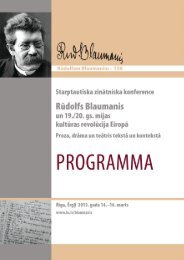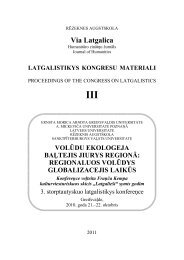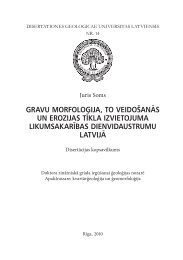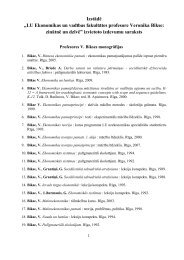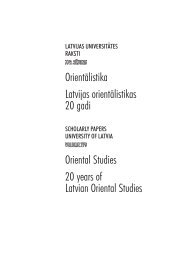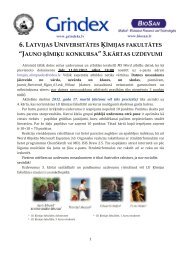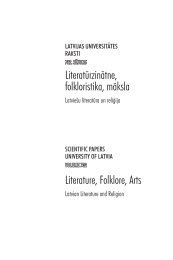Untitled
Untitled
Untitled
You also want an ePaper? Increase the reach of your titles
YUMPU automatically turns print PDFs into web optimized ePapers that Google loves.
Viktors Ivbulis. Dvîòu satikðanâs<br />
the Soul– his breaths do not depart…As the slough of snake lies on an ant–hill, dead,<br />
cast off, even so lies his body. But this incorporal, immortal Life (prâna) is Brahma<br />
indeed, is light indeed. 15 . From this idea it naturally follows that there is no joy in the<br />
finite– be it even one’s own son. Yet Manu, by far not being the defender of the importance<br />
of wordly life, indicates: “Acting out of desire is not aproved of, but here<br />
on earth there is no such thing as no desire; for even studying the Veda and engaging<br />
in the rituals enjoined in the Veda are based upon desire.” 16 Long life as a reward for<br />
good behaviour also cannot be regarded but as the satisfaction of every living being’s<br />
most basic desire: “A man who follows the conduct of the virtuous, has faith and is<br />
free from envy, lives a hundred years, though he be entirely destitute of auspicious<br />
marks.” 17 It is also Manu – the spiritual teacher who establishes the ratio between<br />
highest and lowest wages as six to one. In what contemporary country is anything<br />
like that established? The same law– giver also declares: “Anything that a man does<br />
with the eye on the afterlife, and that is done at the expense of his dependants, has an<br />
unhappy consequence for him both while he is living and after he dies.” 18 One also<br />
should remember that both Shiva and Vishnu’s heaven offers its happy inhabitants by<br />
far not only spiritual but also wordly pleasures. So much so that one starts wandering<br />
how, for instance, a person whose body has been discarded (obligatorily cremated if<br />
he is not a sanyâsî) can enjoy the pleauses offered by heavenly beauties.<br />
It seems at least to me that in the enumerations of duties or among the traits of<br />
recommended good behaviour almost purely mundane and generally human aspects<br />
even in later religeous literature often predominate. What else can be said about<br />
“Vishnu Purâna’s” mentioning the obligations of all four varnas: “These are, the acquisition<br />
of property, for the suport of their families; cohabitation with their wives,<br />
for the sake of progeny; tenderness towards all creatures, patience, humility, truth,<br />
purity, contentment, decency of decoration, gentleness of speech, friendliness; and<br />
freedom from envy and repining, from avarice, and from detraction. These are also<br />
the duties of every condition of life.” 19 . Different but hardly more otherwordly are the<br />
ten sins mentioned by another Purâna: “Not giving a gift on auspicious days, doing<br />
forbidden things, violence, commiting adultery, speaking harsh words, uttering falsehood,<br />
scandalising words, nonsensical words, coveting another man’s death, wishing<br />
evil of others” 20 .<br />
There is much supernatural “Mahâbhârata”. Yet the main action is driven ahead<br />
by purely worldly motives, it is only superficially covered by a veil of religious injunctions.<br />
The Pândavas and Kauravas fight for power, the enlargement of the state<br />
and personal gains, be it wealth or fame. Even to us – people of different cultural<br />
background is understandable what Bhîshma tells Yudhisthira: “Pride, malice, slander,<br />
wiliness and incapacity to hear other peoples good, are vices, o Kuru chief, that<br />
are to be seen in persons of impure soul under the influence of covetousness.” 21 .<br />
Regardless of Judhisthira’s pious but unconvincing speeches and Bhîshmas sermons,<br />
which were hardly a part of the original epic, artha – worldly gains practically is the<br />
only aim of the warrior varna. This is well revealed in Arjuna’s, Bhîma’s, Draupadî’s<br />
and even Krishna’s utterances at the end of the epic. The warriors of both sides know<br />
that if they die, the heaven will keep its doors open to them, yet none is ready to part<br />
with his body and to end the supposed sufferings it causes. All Krishna’s tricks with<br />
the help of which Arjuna kills his most outstanding enemies are also of a purely<br />
13



